#full stack software developer
Text
#programming#software engineering#full stack software developer#compsci#python#bash#shell#php#golang
66 notes
·
View notes
Text
Full Stack Developer vs. Front End Developer vs. Back End Developer
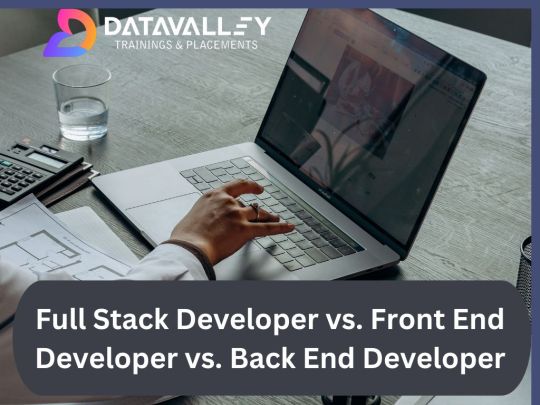
The role of a web developer is always included in the lists of high-paying IT jobs. This is because web developers are essential in today’s digital world. They create amazing websites, high-performing e-commerce sites, and other web-based applications. If you want to be a web developer, you must understand that full-stack developer skills are in great demand. However, do you understand the differences between full-stack, front-end, and back-end web development? In this post, we’ll see the differences between these three job roles, skills, and salaries.
What is Web Development?
The process of developing a website on the internet is known as web development. The non-design components of a website, such as building features and functioning with programming, markup, and scripting languages, are referred to as web development. Developers focus on technical aspects of website development such as architecture, programming, and application integration, as well as visuals.
A web developer is someone who does the following:
Creates and maintains webpages and other web-based applications.
Creates a website from a web design.
They collaborate with clients, stakeholders, and designers to understand the concept.
Can focus on frontend or backend development. Even as a full-stack developer, if necessary.
Types of Web Development
Front End Development: This aspect of web development focuses on what the user interacts with directly, i.e., the user interface of a website or web application. Front-end development deals with the design, layout, and interactivity of a site, ensuring that it’s visually appealing and user-friendly.
Back End Development: The back end is the part of a website or application that operates behind the scenes. It manages data, user authentication, and the server-side logic, ensuring the smooth functioning of the website.
Now, let’s delve into each of these roles in detail.
What is front-end development?
Front-end development, often referred to as client-side development, is the process of creating the visual elements of a website or web application that users interact with directly. It involves writing code for the user interface, optimizing website performance, and ensuring the site looks and functions correctly on various devices and browsers.
Who is a front-end developer?
A front-end developer, also known as a client-side developer, is responsible for turning web designs into a functioning website or application. They work closely with web designers and back-end developers to create an engaging and responsive user experience.
What are the front-end developer’s skills?
Front-end developers should be proficient in the following skills:
Mastery of HTML (Hypertext Markup Language) and CSS (Cascading Style Sheets) is fundamental for structuring and styling web pages.
Proficiency in JavaScript is crucial for adding interactivity and dynamic features to a website.
Knowledge of front-end frameworks like React, Angular, or Vue.js, which simplify and expedite development.
The ability to create websites that look and function well on various devices and screen sizes.
Ensuring that the website performs consistently across different browsers.
Familiarity with version control systems like Git for code management and collaboration.
Front End Developer Salary
The salary of a front-end developer can vary based on factors such as experience, location, and the company. On average, junior front-end developers can earn between $50,000 and $70,000 annually, while senior front-end developers can command salaries ranging from $90,000 to $120,000 or more.
What is Back End Development?
Back-end development, often referred to as server-side development, focuses on the server and database sides of a website or web application. It involves building and maintaining the server, databases, and applications that enable the front end to function correctly.
Who is a Back End Developer?
A back-end developer is responsible for managing the server, databases, and server-side logic of a website or application. They ensure that data is stored securely, accessed efficiently, and transmitted effectively between the front end and back end.
What are Back End Developer Skills?
Back-end developers should have expertise in the following areas:
Server-Side Programming Languages: Proficiency in languages such as Python, Ruby, Node.js, PHP, or Java is used to build server-side applications.
Databases: Knowledge of database management systems like MySQL, PostgreSQL, MongoDB, and NoSQL databases.
APIs: The ability to create and manage APIs (Application Programming Interfaces) for communication between the front end and back end.
Server Management: Skills in managing web servers and server infrastructure.
Security: Understanding web security practices and techniques to protect user data.
Version Control/Git: Proficiency in version control systems to manage and collaborate on code.
Back End Developer Salary
Back-end developer salaries can also vary based on experience, location, and the organization. Junior back-end developers can earn an annual salary ranging from $60,000 to $90,000, while senior back-end developers can expect salaries ranging from $100,000 to $150,000 or more.
Frontend vs. Backend Development
Front-end and back-end development are two halves of a whole, and they must work together seamlessly to create a functional website or application. While front-end developers focus on user interface and design, back-end developers deal with the underlying server infrastructure and data management. Both roles are essential for a successful web project.
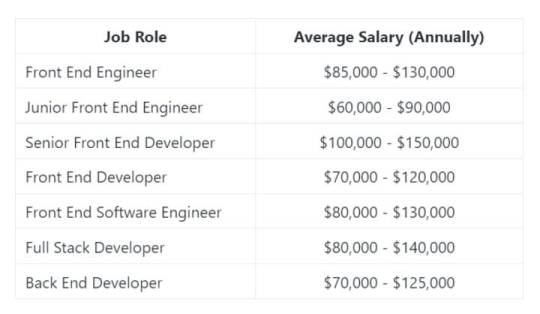
What is a Full Stack Developer?
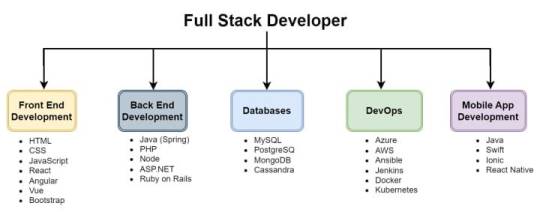
Who is a Full Stack Developer?
A full stack developer is a well-rounded professional who can take care of every aspect of web development, from designing the user interface to managing databases and server-side logic. They bridge the gap between front end and back-end development, ensuring that the entire application functions cohesively.
What are the Full Stack Developer Skills?
Full stack developers need a broad range of skills, including:
HTML/CSS: Proficiency in front end technologies for web page structuring and styling.
JavaScript: Mastery of JavaScript for creating dynamic and interactive web elements.
Front End Frameworks: Knowledge of front-end frameworks for efficient development.
Server-Side Programming Languages: Expertise in languages like Node.js, Python, Ruby, or Java for server-side development.
Databases: Proficiency in database management systems for data storage and retrieval.
APIs: Ability to create and manage APIs for communication between the front end and back end.
Version Control/Git: Familiarity with version control systems for code management.
Problem-Solving: Strong analytical and problem-solving skills to troubleshoot and optimize web applications.
Full Stack Developer Salary
Full-stack web developers are in high demand due to their range of skills and extensive knowledge. An average full stack developer’s annual salary might range from $110,000 to $150,000, based on their skill set and expertise.
Full-stack engineers earn more money than front end or back end developers. Employers agree to pay more for a full stack developer since it makes more business sense to hire one person with front and back end expertise rather than two.
As a result, the profession of a full stack developer is a profitable alternative for aspirants looking to create a career in the digital business.
The choice between becoming a full stack developer, front end developer, or back end developer depends on your interests, strengths, and career goals. Front end developers excel at creating visually appealing and user-friendly interfaces; back end developers focus on the server-side and data management; and full stack developers possess a comprehensive skill set that allows them to manage the entire development process. Each role is integral to the web development ecosystem, and the right one for you depends on your passions and aspirations within the field.
If you’re considering the path of a full stack developer and are eager to acquire the comprehensive skill set required to excel in this role, we have an excellent suggestion for you. Consider enrolling in the Full Stack Developer course at Datavalley.
Datavalley has a stellar track record of empowering aspiring developers with the knowledge and expertise to succeed in the dynamic world of web development. Their course covers everything from the fundamentals of HTML and CSS to in-depth training in JavaScript, front end and back end frameworks, and much more.
By joining Datavalley’s Full Stack Developer course, you’ll gain hands-on experience, build an impressive portfolio, and be well-prepared for a rewarding career in web development.
Don’t miss out on this opportunity to kickstart your journey as a Full Stack Developer with Datavalley. Your future in web development awaits. Take the first step today!
Attend Free Bootcamp at Datavalley
If you’re looking to supercharge your Java development skills and become a full-stack Java developer, consider joining the Java Full Stack Developer bootcamp at Datavalley. It’s an excellent opportunity to enhance your expertise and take your career to the next level.
Key points about Bootcamps:
It is completely free, and there is no obligation to complete the entire course.
20 hours total, two hours daily for two weeks.
Gain hands-on experience with tools and projects.
Explore and decide if the field or career is right for you.
Complete a mini project.
Earn a certificate to show on your profile.
No commitment is required after bootcamp.
Take another bootcamp if you are unsure about your track.
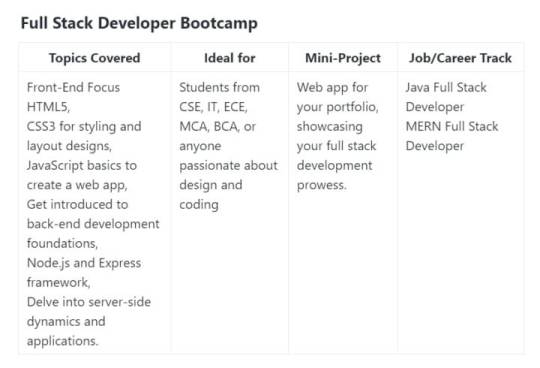
#datavalley#dataexperts#data engineering#data analytics#dataexcellence#business intelligence#data science#power bi#data analytics course#data science course#full stack course#full stack training#full stack web development#full stack developer#full stack software developer#front end developers#back end development
5 notes
·
View notes
Text
The Profound Benefits of Embracing Full Stack Development
Introduction: In the dynamic realm of software development, full stack developers have emerged as indispensable assets, equipped with the skills to navigate both front-end and back-end technologies seamlessly. This comprehensive exploration sheds light on the multifaceted advantages of embracing full stack development, unveiling the unique benefits and opportunities that accompany proficiency in both facets of the development stack.
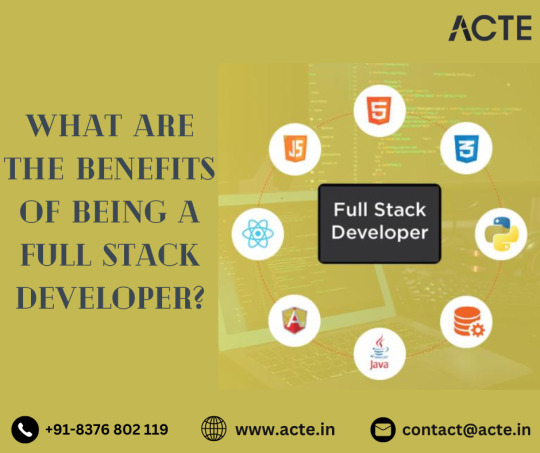
Unlocking the Benefits of Full Stack Development:
Versatility and Adaptability: Full stack developers possess a diverse skill set, encompassing proficiency in both front-end and back-end technologies. This versatility enables them to fluidly transition between different aspects of development, adeptly adapting to project requirements and challenges.Mastery of client-side and server-side technologies empowers full stack developers to tackle a myriad of tasks, from crafting intuitive user interfaces to implementing complex business logic. This adaptability renders them invaluable assets to development teams, capable of contributing to various stages of the software development lifecycle with finesse.
Comprehensive Project Ownership: A defining advantage of full stack developers lies in their ability to assume end-to-end ownership of projects, from inception to deployment. With a comprehensive understanding of both front-end and back-end technologies, full stack developers can oversee all facets of development, ensuring seamless integration and coherence throughout the project lifecycle.This holistic perspective empowers full stack developers to make informed decisions at every juncture of development, from conceptualization and architecture to execution and optimization. By embracing responsibility for the entire project, full stack developers drive efficiency, consistency, and quality, culminating in successful project outcomes.
Expanded Employability and Career Prospects: Full stack developers are highly coveted by employers owing to their diverse skill set and capacity to work across multiple technologies. Proficiency in both front-end and back-end technologies opens the door to a plethora of career opportunities across various industries and sectors.Employers prize full stack developers for their adaptability, versatility, and ability to deliver end-to-end solutions that align with business objectives. Whether it entails developing web applications, mobile apps, or enterprise software, full stack developers are poised to excel in diverse roles and environments, making them sought-after candidates in the job market.
Efficient Collaboration and Communication: Full stack developers excel in cross-functional collaboration, proficiently communicating with designers, product managers, and fellow developers alike. Their grasp of both front-end and back-end technologies bridges the gap between different teams and departments, fostering smoother communication and collaboration.This collaborative prowess enables full stack developers to seamlessly integrate with cross-functional teams, ensuring that project requirements are comprehended, feedback is incorporated, and deliverables are met punctually and within budget constraints. By fostering a culture of collaboration and synergy, full stack developers contribute significantly to project success and organizational growth.
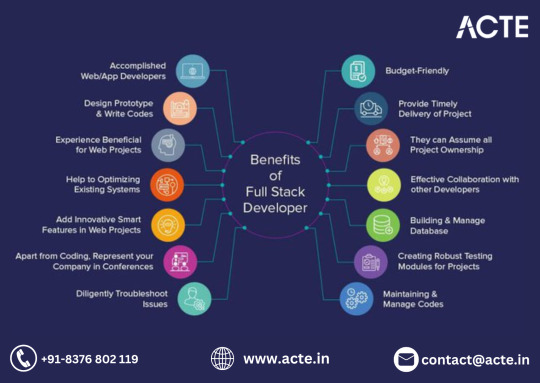
Agile Prototyping and Iteration: Full stack developers possess a knack for rapid prototyping and iteration, leveraging their comprehensive understanding of both front-end and back-end technologies. This proficiency enables them to swiftly prototype and iterate on features, accelerating development cycles and fostering innovation.By gathering feedback iteratively and swiftly incorporating user input and stakeholder feedback, full stack developers expedite the development process. This agile approach allows them to identify and address issues promptly, resulting in faster development cycles and heightened product quality.
Holistic Problem-Solving Proficiency: Full stack developers boast holistic problem-solving skills, enabling them to tackle challenges across the user interface and server layers. With an in-depth comprehension of both front-end and back-end technologies, full stack developers approach problems from diverse angles, exploring a plethora of solutions and technologies to pinpoint the most effective remedy.This comprehensive problem-solving approach fosters creativity, innovation, and critical thinking, as full stack developers explore various methodologies and techniques to resolve intricate problems. By harnessing their diverse skill set and experience, full stack developers surmount obstacles and deliver innovative solutions that cater to user needs and business imperatives.
Continuous Learning and Professional Growth: Full stack development is an ever-evolving domain that encourages continuous learning and professional growth. With new technologies, frameworks, and best practices perpetually emerging, full stack developers have ample opportunities to augment their skill set and remain abreast of industry trends.Continuous learning is inherent to the full stack developer role, necessitating a commitment to staying abreast of the latest advancements in both front-end and back-end technologies. By investing in continuous learning and professional development, full stack developers remain competitive in the job market and position themselves for sustained success in their careers.
Conclusion: In summary, embracing full stack development bestows a myriad of advantages and opportunities, ranging from versatility and end-to-end project ownership to enhanced employability and continuous learning. By mastering both front-end and back-end technologies, full stack developers are primed to excel in diverse roles and environments, driving innovation and success in the ever-evolving sphere of software development. Whether you're an established developer or an aspiring professional, embracing full stack development opens doors to a world of possibilities and professional fulfillment.
#full stack course#full stack developer#full stack software developer#full stack training#full stack web development
4 notes
·
View notes
Text
#full stack web development#full stack training#full stack python training in ameerpet#full stack developer#full stack software developer
2 notes
·
View notes
Text
Shout out to all the brilliant female coders! Much respect !

#coding#coding memes#full stack developer#full stack software developer#full stack engineer#hacking#software#software developer#software engineer#reactjs
17 notes
·
View notes
Text
Why are single page applications in demand?
If an e-commerce site is making $100,000 per day, a 1 second page delay could potentially cost them $2.5 million in lost sales every year. – A survey by Akamai and Gomez dot com
Single Page Application delivers dynamic updates and decreases server load significantly. Also, now more and more applications are being built on microservices architecture.
Get insights on benefits of SPA
If you are in a dilemma about building SPAs and MPAs, contact our experts to get a better understanding.
3 notes
·
View notes
Text
What is the salary of a 2 years experienced Full Stack Developer?
Introduction
In the fast-paced world of technology, experience often translates to expertise and increased earning potential. For full stack developers with two years of industry experience, the question of salary is of paramount importance. As these professionals navigate their careers and seek new opportunities, understanding the salary landscape becomes crucial. In this blog, we delve into the salary expectations of 2 years experienced full stack developers and explore factors that influence their compensation best full stack classes in pune.
Experience as a Valuable Asset
With two years of experience under their belt, full stack courses in pune have likely honed their skills and gained practical insights into various aspects of web development. They are adept at handling both front-end and back-end technologies, making them valuable assets to tech companies seeking versatile talent full stack online training
.
Factors Influencing Salary
Several factors influence the salary expectations of 2 years experienced ,full stack training:
1. Skill Set: The breadth and depth of a developer’s skill set significantly impact their earning potential. Proficiency in a wide range of programming languages, frameworks, and tools can command higher salaries.
2. Specializations: full stack course may specialize in certain areas such as JavaScript frameworks (e.g., React, Angular), back-end technologies (e.g., Node.js, Django), or database management systems (e.g., MySQL, MongoDB). Specialized skills often lead to higher compensation.
3. Geographic Location: Salary levels can vary based on the cost of living and demand for tech talent in different geographic locations. Developers working in tech hubs like Silicon Valley may command higher salaries compared to those working in smaller cities or rural areas.
4. Company Size and Industry: The size and industry of the employing company also play a role in salary negotiations. Established tech companies and industries with high demand for technical talent may offer more competitive compensation packages full stack classes near me.
5. Professional Development: Continued learning and professional development initiatives can enhance a developer’s value in the job market. Certifications, advanced courses, and participation in tech communities may positively influence salary negotiations with full stack online courses.
Salary Expectations
While salary figures may vary based on the factors mentioned above, 2 years experienced full stack developers can generally expect competitive compensation. In regions like the United States, salaries for mid-level developers typically range from $70,000 to $110,000 per year, depending on location and skill set.
In India, where the tech industry is thriving, 2 years experienced full stack training in pune can expect salaries ranging from INR 6,00,000 to INR 10,00,000 per annum, with variations based on location, company size, and specialization.
Conclusion
For 2 years experienced full stack classes in pune, salary expectations are influenced by a myriad of factors including skill set, specialization, geographic location, company size, and professional development. By understanding these factors and conducting thorough research, developers can negotiate competitive compensation packages that reflect their expertise and contributions to the tech industry. As they continue to grow and evolve in their careers ,full stack classes .Experienced full stack online classes can look forward to exciting opportunities and rewarding salaries in the dynamic world of technology.
#full stack training in pune#full stack developer classes in pune#best full stack developer course in pune#full stack developer course pune#full stack courses in pune#full stack classes in pune#full stack training#full stack course#full stack developer#full stack software developer#full stack web development
0 notes
Text
Top-notch Full Stack Web Development Course
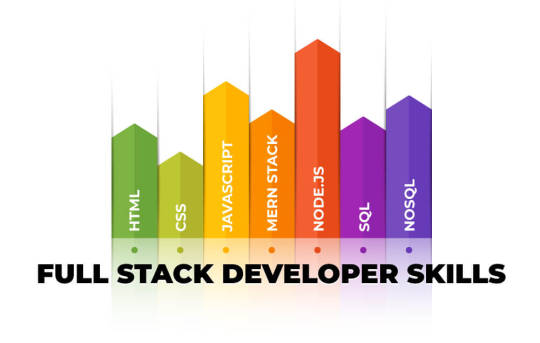
From HTML to React, master every layer of web development in our Full-Stack Web Development Course. Enroll now!
#web development#web developers#full stack web development#full stack developer#full stack course#kolkata#full stack training#full stack software developer
1 note
·
View note
Text

Full Stack Training in Electronic City Bangalore
Embark on a journey into the realm of coding excellence! 🌐✨ Uncover the Code Highlights of our Full-Stack Training in Electronic City, Bangalore. At eMexo Technologies 💻🚀
For more details: https://www.emexotechnologies.com/courses/full-stack-certification-training-course/
Reach us👇
📞 +91 9513216462
🌐https://www.emexotechnologies.com
🌟 Why Choose eMexo Technologies?
Expert Trainers🧑💻
Comprehensive Courses📚
Hands-On Learning💻
Flexible Learning Options💡
Placement Assistance💼
Cutting-Edge Curriculum🛠️
Real-time projects✨
Affordable Pricing🚀
🏆 Best Full Stack Training Institute in Electronic City, Bangalore!
📆 Enroll Now! Classes are filling up fast!
#fullstackjava#fullstackdeveloper#full stack web development#full stack developer#fullstack#full stack course#full stack training#emexotechnologies#electroniccity#bangalore#traininginstitute#course#education#careers#learning#jobs#training#full stack software developer#techeducation#software#careerdevelopment#information technology#onlinetraining
0 notes
Text
Fullstack Development Services - Synsoft Global
Empower your digital journey with Synsoft Global's Fullstack Development Services. Seamlessly blending technology to craft solutions that creates the way for your success story. Visit Now:
#synsoft global#mobile app development#hire fullstack developer#full stack development services#full stack software developer#full stack development agency#fullstack development company
0 notes
Text
entry level full stack developer with 6-12 years experience needed. that is crazy.
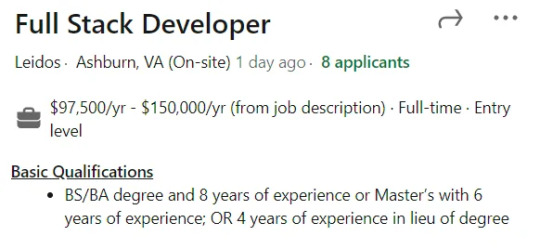
13 notes
·
View notes
Text
5 Reasons to Become a Full Stack Developer
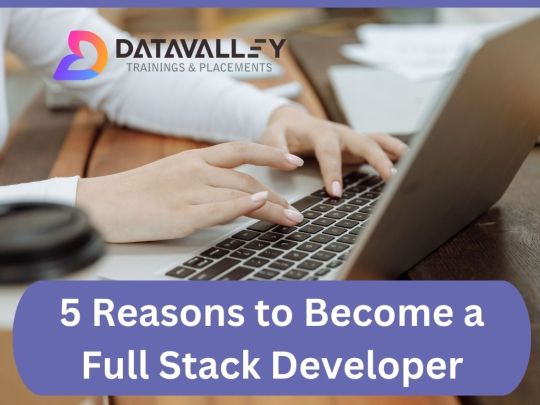
Many engineers and professionals nowadays master full-stack development skills to help them advance in their careers. While top companies like Google, Amazon, and Microsoft continue to hire experienced full-stack developers, many people believe the career is unstable and risky. Is it worthwhile to pursue a profession in full-stack Java development? Yes, indeed! By learning the necessary skills and gaining hands-on experience to become a competent full-stack Java developer, you could gain tremendous benefits. Before pursuing a career in full-stack programming, it is critical to clear your uncertainties.
This blog post will lead you through the benefits of learning full-stack Java development and establishing a career in the field.
1. Working on Cutting-Edge Technologies
Full stack developers often find themselves at the forefront of technological innovation. They get to experiment with the latest frameworks, libraries, and programming languages in both front-end and back-end development. This constant exposure to cutting-edge tech keeps their skills sharp and their work engaging. Whether it’s creating responsive user interfaces or optimizing server performance, full stack developers are hands-on with the most current tools and techniques.
2. Global Opportunities
The global demand for your skills is one of the benefits of being a full stack developer. With the rise of remote work and an increased reliance on web-based solutions, your abilities can be utilized anywhere in the world. This means you’ll be able to work for organizations in other countries, contributing to a variety of initiatives and widening your perspectives. The global nature of full stack development provides an exceptional opportunity to interact with people from all cultures and backgrounds.
Remote employment is typically appealing to full stack engineers. Working remotely is especially appealing to those who want location independence or have personal responsibilities that necessitate a flexible schedule.
3. Competitive Salaries
The demand for full stack developers is on the rise, and with the demand comes competitive salaries. Because of their extensive skill set and ability to work on both the front-end and back-end of web applications, full stack developers are among the highest paid in the tech sector. If you want a financially rewarding profession, becoming a full stack developer is a great decision.
Companies value full stack developers for their ability to streamline development processes and bridge the gap between different teams. This high demand for full stack skills translates to higher salaries and numerous job opportunities. Full stack developers often find themselves in a favorable bargaining position when negotiating compensation packages.
4. Career Growth Options
Choosing a profession as a full stack developer opens up prospects for enormous advancement. According to the US Bureau of Labor Statistics, the number of full stack development jobs will increase dramatically in the next few years. This means that talented full stack developers will have plenty of options to find work and progress their careers. A full stack developer career offers a wide range of prospects, as full stack developers are top-tier engineers with exceptional abilities to engage with many development components at any step of the process.
Companies are also choosing for one multi-developer rather than multiple developers on the same project these days. It not only saves money but also slows down the development process. This is considerably increasing the need for full stack developers around the world.
5. Cross-Functional Expertise
Full stack developers are like the bridge builders of the tech world. They seamlessly integrate the front-end and back-end components, ensuring that the entire system runs smoothly. Because of their cross-functional experience, they can understand the full picture and develop well-integrated apps. It’s like having a symphony conductor who knows the intricacies of every instrument. Full stack developers can create more efficient, unified, and strong solutions by understanding all sides of the development process. It also fosters better collaboration with different teams, including designers, testers, and product managers.
By mastering both front-end and back-end development, you become a valuable asset in any development team. You can bridge the gap between designers and developers, ensuring that the user interface aligns with the underlying functionality. This cross-functional knowledge allows you to create seamless and efficient web applications.
Conclusion:
The journey of becoming a full stack developer may require dedication, continuous learning, and hands-on experience. However, the rewards are substantial. With opportunities to work on cutting-edge technologies, expand your career globally, earn competitive salaries, explore diverse career paths, enjoy remote work options, and leverage cross-functional expertise, the path of a full stack developer is undoubtedly an enticing one.
So, if you’re passionate about technology and love solving complex problems, full stack development might just be the ideal career for you. As the tech industry continues to evolve, full stack developers will remain invaluable contributors to its growth and innovation. Dive into the world of full stack development, accept its challenges, and start a rewarding journey that will lead to a dynamic and satisfying career.
To kickstart your journey as a Java Full Stack Developer, we suggest you explore the free bootcamp at Datavalley. Our programs provide the training and expertise you need to thrive in this versatile and dynamic field. Join us at Datavalley, and let’s shape the future of technology together!
Key points about Bootcamps:
It is completely free, and there is no obligation to complete the entire course.
20 hours total, two hours daily for two weeks.
Gain hands-on experience with tools and projects.
Explore and decide if the field or career is right for you.
Complete a mini-project.
Earn a certificate to show on your profile.
No commitment is required after bootcamp.
Take another bootcamp if you are unsure about your track.
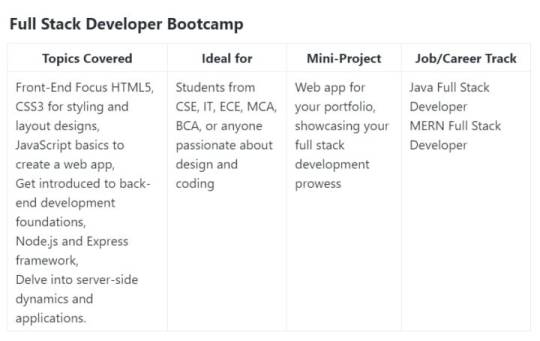
FAQs
1. What is full stack development?
Full stack development refers to the practice of working on both the front-end and back-end of web applications. It involves creating the user interface, implementing functionality, and managing databases and servers.
2. Why should I become a full stack developer?
Full stack developers are in high demand, offering a wide range of career opportunities, competitive salaries, and the chance to work on cutting-edge technologies. Their cross-functional expertise is a valuable asset in the tech industry.
3. Do I need to know multiple programming languages to be a full stack developer?
Yes, full stack developers typically work with various programming languages for front-end and back-end development, depending on the project’s requirements. Common languages include JavaScript, Python, Ruby, and Java.
4. What technologies should I learn to become a full stack developer?
You should focus on technologies like HTML, CSS, JavaScript, front-end frameworks (e.g., React or Angular), back-end frameworks (e.g., Node.js or Django), and databases (e.g., MySQL or MongoDB). Familiarity with version control systems and deployment tools is also crucial.
5. Are full stack developers in demand globally?
Yes, full stack developers are sought after worldwide. As technology continues to advance, the demand for professionals who can work on both the front-end and back-end of applications remains consistently high.
6. Can I work as a remote full stack developer?
Absolutely! Many companies offer remote work options for full stack developers. This flexibility allows you to work from anywhere and collaborate with international teams.
7. What is the career growth potential for full stack developers?
Full stack developers can advance their careers in various directions, such as becoming specialized front-end or back-end developers, technical leads, or even transitioning into roles like DevOps engineers or software architects.
8. What should I look for in a full stack development bootcamp?
A good bootcamp should offer a comprehensive curriculum, experienced instructors, hands-on projects, and real-world experience. Look for programs that align with your career goals and provide the opportunity to work on diverse projects.
9. How long does it take to become a proficient full stack developer?
The duration can vary depending on your background and the intensity of your learning. Datavalley offers programs ranging from four to six months, providing the necessary skills to launch your career.
10. Is a full stack developer’s role suitable for beginners with no prior experience in programming?
Full stack development can be challenging for beginners, but it’s possible to learn with dedication and practice. Our bootcamps are designed to accommodate individuals with no prior experience, making it accessible to newcomers in the field.
#datavalley#dataexperts#data engineering#data analytics#dataexcellence#business intelligence#data science course#data analytics course#power bi#data science#java#java developers#java interview questions#java script#java development company#full stack course#full stack training#full stack developer#full stack web development#full stack software developer#java full stack bootcamp#java full stack training#java full stack course#java full stack developer#free bootcamps
5 notes
·
View notes
Text
The Dynamic Role of Full Stack Developers in Modern Software Development
Introduction: In the rapidly evolving landscape of software development, full stack developers have emerged as indispensable assets, seamlessly bridging the gap between front-end and back-end development. Their versatility and expertise enable them to oversee the entire software development lifecycle, from conception to deployment. In this insightful exploration, we'll delve into the multifaceted responsibilities of full stack developers and uncover their pivotal role in crafting innovative and user-centric web applications.
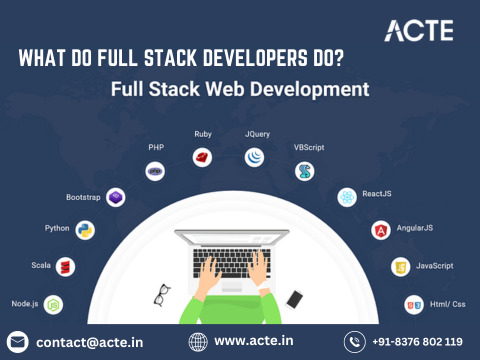
Understanding the Versatility of Full Stack Developers:
Full stack developers serve as the linchpins of software development teams, blending their proficiency in front-end and back-end technologies to create cohesive and scalable solutions. Let's explore the diverse responsibilities that define their role:
End-to-End Development Mastery: At the core of full stack development lies the ability to navigate the entire software development lifecycle with finesse. Full stack developers possess a comprehensive understanding of both front-end and back-end technologies, empowering them to conceptualize, design, implement, and deploy web applications with efficiency and precision.
Front-End Expertise: On the front-end, full stack developers are entrusted with crafting engaging and intuitive user interfaces that captivate audiences. Leveraging their command of HTML, CSS, and JavaScript, they breathe life into designs, ensuring seamless navigation and an exceptional user experience across devices and platforms.
Back-End Proficiency: In the realm of back-end development, full stack developers focus on architecting the robust infrastructure that powers web applications. They leverage server-side languages and frameworks such as Node.js, Python, or Ruby on Rails to handle data storage, processing, and authentication, laying the groundwork for scalable and resilient applications.
Database Management Acumen: Full stack developers excel in database management, designing efficient schemas, optimizing queries, and safeguarding data integrity. Whether working with relational databases like MySQL or NoSQL databases like MongoDB, they implement storage solutions that align with the application's requirements and performance goals.

API Development Ingenuity: APIs serve as the conduits that facilitate seamless communication between different components of a web application. Full stack developers are adept at designing and implementing RESTful or GraphQL APIs, enabling frictionless data exchange between the front-end and back-end systems.
Testing and Quality Assurance Excellence: Quality assurance is paramount in software development, and full stack developers take on the responsibility of testing and debugging web applications. They devise and execute comprehensive testing strategies, identifying and resolving issues to ensure the application meets stringent performance and reliability standards.
Deployment and Maintenance Leadership: As the custodians of web applications, full stack developers oversee deployment to production environments and ongoing maintenance. They monitor performance metrics, address security vulnerabilities, and implement updates and enhancements to ensure the application remains robust, secure, and responsive to user needs.
Conclusion: In conclusion, full stack developers embody the essence of versatility and innovation in modern software development. Their ability to seamlessly navigate both front-end and back-end technologies enables them to craft sophisticated and user-centric web applications that drive business growth and enhance user experiences. As technology continues to evolve, full stack developers will remain at the forefront of digital innovation, shaping the future of software development with their ingenuity and expertise.
#full stack course#full stack developer#full stack software developer#full stack training#full stack web development
2 notes
·
View notes
Text
https://www.excelr.com/full-stack-developer-course-training-in-coimbatore
"Join our comprehensive Full Stack Developer Course in Coimbatore and master the skills needed for both front-end and back-end development. Learn programming languages, frameworks, databases, and deployment strategies to become a proficient full-stack developer ready to tackle real-world projects."
#full stack developer#full stack course#full stack training#full stack web development#full stack software developer
1 note
·
View note
Text
Best Full Stack Developer Training with Certification at Syntax Level Up
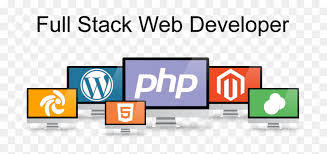
Are you ready to take your career in web development to the next level? Look no further than Syntax Level Up's full stack developer classes in pune with Certification. In this blog post, we'll explore why our program stands out and how it can empower you to become a proficient Full Stack Developer.
Why Choose Syntax Level Up?
At Syntax Level Up, we believe in delivering top-notch training that equips our students with the skills and knowledge needed to succeed in the ever-evolving field of web development. Here's why our full stack training in pune stands out:
Comprehensive Curriculum:
Our training program covers a wide range of topics essential for the best full stack developer course in pune, including front-end technologies like HTML, CSS, and JavaScript, back-end languages such as Node.js or Python, database management, and deployment strategies.
Hands-On Learning:
We understand the importance of hands-on experience in mastering development skills. That's why our training includes practical exercises, projects, and real-world scenarios to ensure you're ready to tackle any challenge in your future career.
Expert Instructors:
Our instructors are industry professionals with years of experience in Full Stack Development. They are passionate about sharing their knowledge and guiding you through your learning journey every step of the way.
Certification:
Upon successful completion of our full stack developer course pune, you'll receive a certification from Syntax Level Up. This certification is a testament to your expertise and can significantly boost your credibility and marketability in the job market.
What You'll Learn
During our Full Stack Developer Training, you'll gain proficiency in:
Building responsive and intuitive user interfaces
Developing server-side applications and APIs
Managing databases and data storage
Implementing deployment strategies and best practices
Troubleshooting and optimizing web applications
Take Your Career to New Heights
Whether you're a beginner looking to start a career in web development or an experienced developer seeking to expand your skill set, Syntax Level Up's Full Stack Developer Training is the perfect opportunity to achieve your goals. Join us and embark on a journey towards becoming a highly sought-after full stack class in pune the tech industry.
Don't miss out on this chance to elevate your skills and advance your career. Enroll in Syntax Level Up's full stack courses in pune today and unlock endless possibilities in the world of web development.
#full stack training in pune#full stack developer classes in pune#best full stack developer course in pune#full stack developer course pune#full stack courses in pune#full stack classes in pune#full stack course#full stack software developer#full stack training#full stack developer#full stack web development
0 notes
Text
Mastering Full Stack Development with an Online Java Course: A Comprehensive Guide
Are you passionate about Java programming and eager to explore the world of Full Stack Development? An Online Java Full Stack Course might be the perfect opportunity for you to enhance your skills and dive into the exciting realm of web development. In this article, we will delve into what an Online Java Full Stack Course entails, its benefits, and how it can catapult your career in the tech industry.
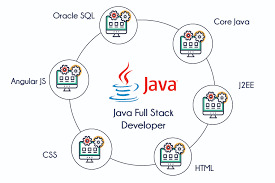
Understanding Online Java Full Stack Courses
An Online Java Full Stack Course is designed to equip learners with the comprehensive skills required to develop both the front end and back end of web applications using Java-based technologies. It covers a wide array of topics ranging from Java programming fundamentals to advanced concepts in web development, databases, frameworks, and deployment strategies. The course typically includes modules on:
1. Java Programming: Covers core Java concepts such as object-oriented programming (OOP), data structures, algorithms, and Java libraries.
2. Front End Development: Includes HTML, CSS, JavaScript, and popular front-end frameworks like React, Angular, or Vue.js.
3. Back End Development: Focuses on server-side programming using Java frameworks like Spring Boot, Hibernate, or Java EE.
4. Database Management: Covers SQL (Structured Query Language) and relational database management systems (RDBMS) like MySQL, PostgreSQL, or Oracle.
5. Full Stack Project: Hands-on projects to integrate front end, back end, and database components into a complete web application.
6. Deployment and DevOps:Strategies for deploying web applications on cloud platforms like AWS, Azure, or Heroku, along with version control using Git.
Benefits of an Online Java Full Stack Course
1. Flexibility: Online courses allow you to study at your own pace and schedule, making them ideal for working professionals or students with busy lifestyles.
2. Comprehensive Curriculum:A well-structured course covers all aspects of Full Stack Development, ensuring you gain proficiency in both front end and back end technologies.
3. Hands-on Learning: Through practical assignments, projects, and coding exercises, you gain valuable hands-on experience essential for real-world application development.
4. Access to Industry Experts: Many online courses offer mentorship or access to experienced instructors who can guide you throughout the learning journey.
5. Cost-Effective: Online courses often offer competitive pricing compared to traditional classroom-based programs, making quality education more accessible.
6. Networking Opportunities: Engage with a diverse community of learners, participate in forums, and collaborate on projects, fostering a network of like-minded professionals.
How to Choose the Right Online Java Full Stack Course
When selecting an Online Java Full Stack Course, consider the following factors:
1. Curriculum:Ensure the course covers essential topics in Java programming, front end development, back end frameworks, databases, and deployment.
2. Instructor Expertise: Look for courses taught by industry experts or experienced developers with a track record of successful projects.
3. Hands-on Projects: Check if the course includes hands-on projects or real-world assignments to apply theoretical knowledge.
4. Student Reviews and Ratings: Read reviews and testimonials from past students to gauge the course's quality, support, and effectiveness.
5. Certification and Career Support: Check if the course offers a certificate of completion and provides career support such as resume building, interview preparation, or job placement assistance.
Conclusion
Enrolling in an Online Java Full Stack Course opens doors to a wealth of opportunities in the tech industry. Whether you aspire to become a Full Stack Developer, Software Engineer, or pursue entrepreneurial ventures, mastering Java Full Stack Development can be a game-changer for your career. With dedication, continuous learning, and practical experience gained through online courses, you can embark on a rewarding journey of building innovative web solutions and contributing to the ever-evolving world of technology.
Readmore:#FullStackDevelopmentInPune , #FullStackclassesinPune ,
#FullStackcourseinPune ,
#fullstack,
#fullstacktraininginpune
#FullStackcourseinPune#full stock#full stack developers in pune#fullmetal alchemist#full stack developer#sap courese in pune#sap course#full stack training#sap fico course#full stack java developer in pune#full stack web development#full stack course#full stack software developer
0 notes